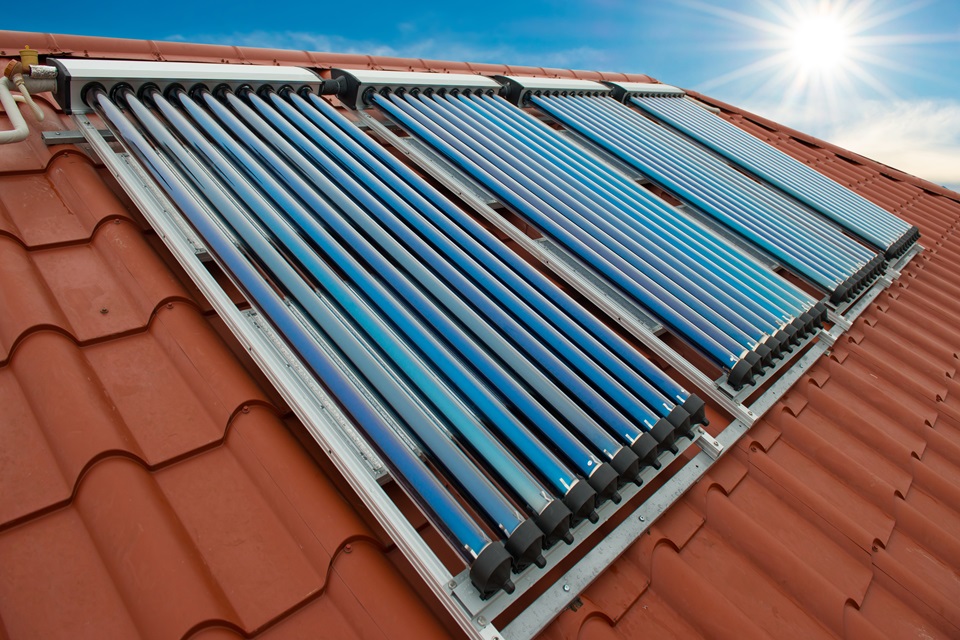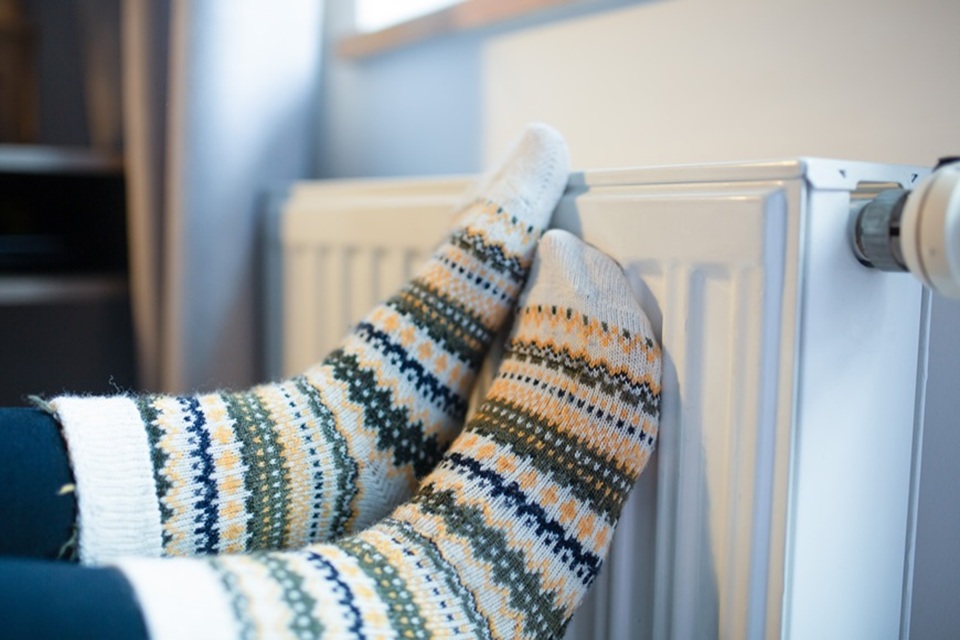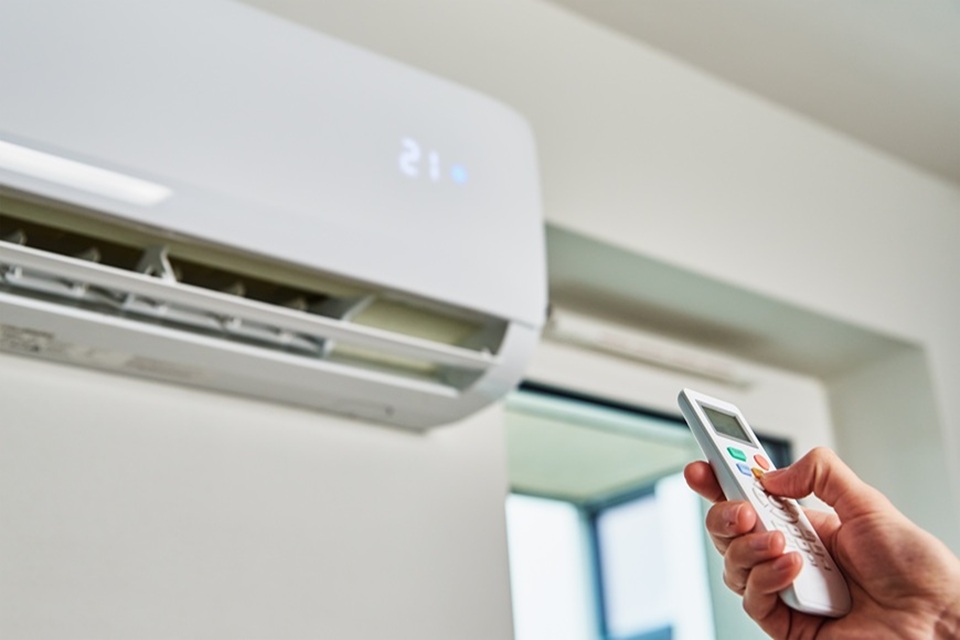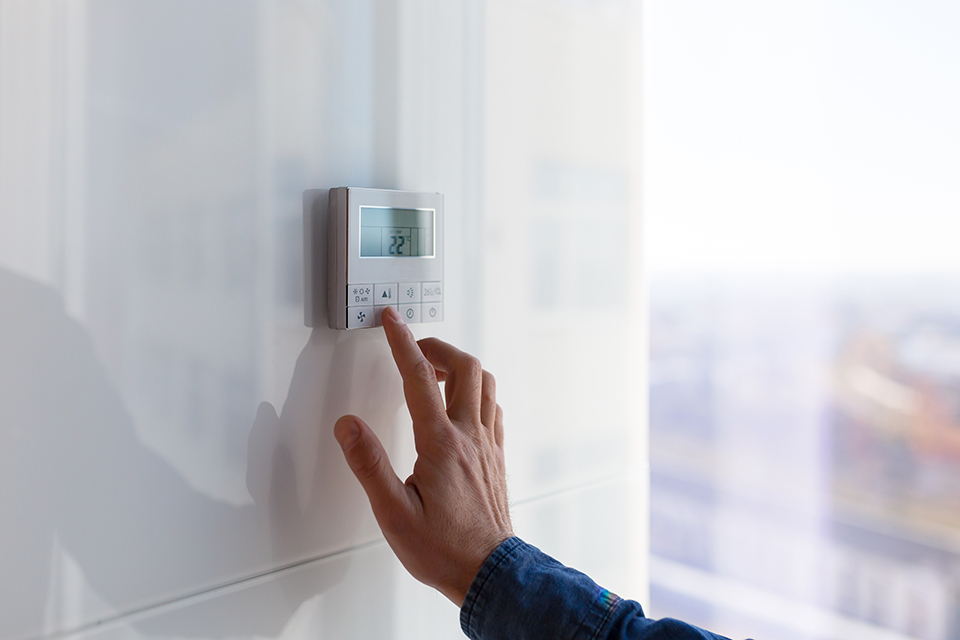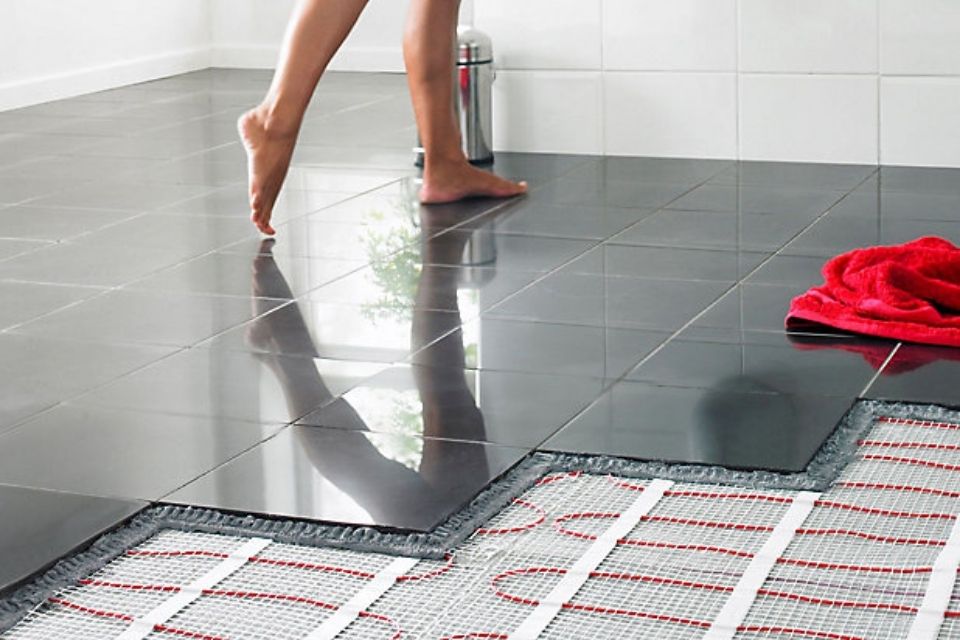How Much Does a Solar Water Heating System Cost?
You’ll need to install solar thermal panels on your roof. These panels are filled with a mixture of water and glycol, which collect energy from the sun. The heat warms up the liquid in the panels, and this is pumped through a hot water cylinder to heat your water.
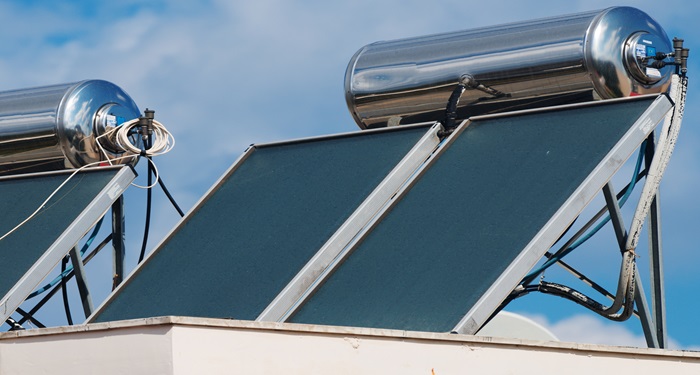
To install a solar water heating system, you’ll need solar panels and a hot water cylinder. Solar Panels for a 3-bedroomed property will cost between £7,000 and £10,000 for the panels.
For example, a 3-bedroomed house where there are 4 people will commonly need a 4kW or kW system with 16 or 20 panels on the roof.
If you want a hot water solar system in a 2-bedroom house, then you can expect to pay between £5,500 and £6,000. A larger house with 4-5 bedrooms will cost in the region of £9,000 to £11,000 for a 6kW system.
On top of the cost of solar panels, you will also need a hot water cylinder. You can pay between £400 to £2,100 for a hot water cylinder with installation costs of between £320 and £640.
If you decide to install a heat pump in combination with solar panels, you can expect to pay between £2,350 and £14,100, depending on the type of heat pump you need. The installation will cost between £2,200 and £6,500.
This means a solar thermal system’s price can vary. You can pay between £7,320 and £10,640 for panels and a hot water cylinder.
Most solar companies will give you an all-around figure, which includes the purchase and installation of the panels. If you buy the panels yourself and hire a solar panel technician to install them, then you will probably pay between £600 and £1,200 for installation.
A solar panel company should assess the suitability of your home for solar water heating installation. They will look at your home’s orientation, the condition of your roof and whether or not your hot water tank is compatible.
Solar Water Heating System Prices
| Solar Water Heating Types | Average Costs |
|---|---|
| Flat Plate | £3,000 - £4,000 |
| Evacuated Tubes | £2,700 - £5,000 |
| Thermodynamic panels | £500 - £600 |
| Solar-assisted heat pumps | £5,000 - £7,000 |
Solar hot water system costs will vary according to the size of the system and whether any additional components are needed.
Before you decide to invest in solar water heating, you will need to estimate your average hot water use to ensure that you have the correct number of panels. The usual measurement is to install 1 or 2 square metres of panels for every person who lives in your home. If there are 4 people in your household, then you will need between 4 and 8 square metres of panel.
You will also have to consider the volume in your water tank. If you have 8 metres of solar panel you will need a tank that holds between 240 and 480 litres of water. You can buy solar cylinders that connect to solar panels. The average cost of a 250-litre tank is between £950 and £1,500. A tank holding 500 litres will cost between £2,100 and £2,400.
- What are the Additional Costs of Installing Solar Panels
- Tradesperson Costs for Installing a Solar Water Heating System
- How Long Does It Take to Install a Solar Water Heating System?
- Types of Solar Water Heating Systems
- Pros and Cons of Solar Water Heating
- How Much Does it Cost to Maintain a Solar Water Heating System
- FAQs
- Sources
What are the Supply Costs for Solar Heating Systems?
The cost of solar water heating will depend on the company you use to install the system.
Most companies will charge you a flat fee for the supply and fit of solar panels. But if you are planning to buy the panels yourself and have them fitted by an electrician, then the costs will vary. You might want to buy a solar panel kit that includes all the components, the solar panel, and a battery if you want to include this in your system.
Low kilowatt systems are the cheapest. For example, a 2.2kW kit with 6 solar panels but no battery will cost an average of £2,700. The same kit, including a battery, will cost between £3,500 and £4,700. In comparison, a 3.7kW kit with 8 panels will cost around £3,500 without a battery and between £4,500 and £6,000.
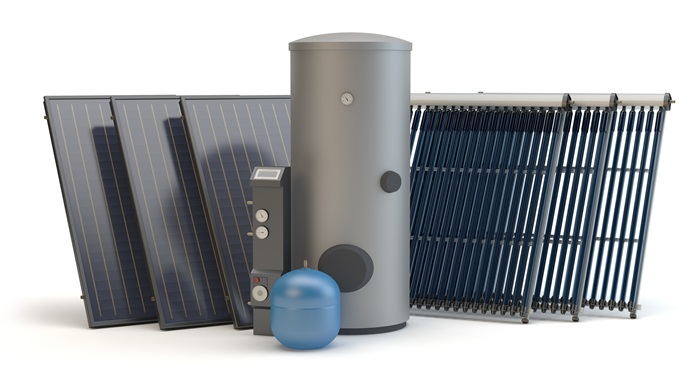
To buy a solar panel, you will only be looking at between £100 and £125 for a 120W panel or between £200 and £225 for a 200W panel.
You’ll also have to buy panel mounts, which cost on average between £4.00 and £30,00 depending on the type of mount you require. If you have a battery, you will also need a charge controller, which will cost between £19 and £150. Solar cables range from under one pound for 50mm standard cable to £270 for 50mm high-performance cable.
You’ll also need a hot water cylinder. Twin coil heaters are a good solution for a solar water heating system. This is because you can combine two energy sources within one cylinder. The cylinder coils can heat water from solar panels or a traditional heat source such as electricity.
Cylinders are either vented or unvented. Vented cylinders take hot water from a water tank, which is usually located in a loft. An unvented water cylinder takes cold water from the mains and heats it up using your installed heating system, such as a solar panel.
What are the Additional Costs of Installing Solar Panels
It’s not just the solar water heating installation price you need to consider. There are also additional charges you might have to add to your budget.
Installing solar panels will also mean adding the cost of scaffolding to your budget. You will also need your roof to be in good condition. If you have any broken or missing tiles, they will need to be replaced.
While you have used the scaffolding, it might also be a good idea to have your guttering cleaned and your fascias and soffits checked.
Another job you might consider whilst you have scaffolding is painting the external walls of your property.
Scaffolding
Scaffolding prices depend on the amount of scaffolding you need and the ease of access. You’ll find the cost of hiring scaffolding is higher in London and the South East of England, where the cost of services tends to be higher than in other parts of the UK.
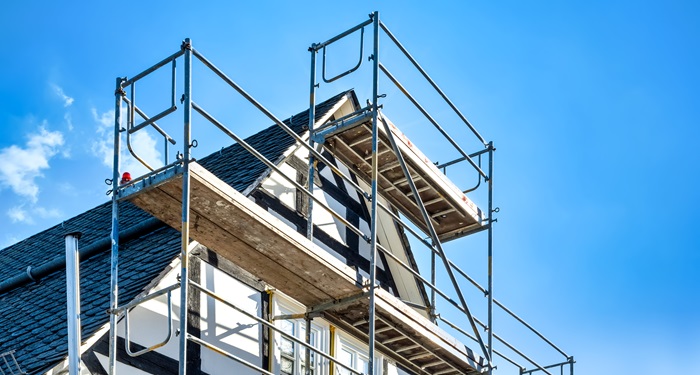
The cost to hire a scaffold tower is, on average, between £200 and £300. To scaffold 3 sides of a semi-detached house will cost in the region of £800 to £1,000. A detached bungalow will cost around £600 to £700.
The company installing your solar panels may have its own scaffolding team, and they will either include the cost in your overall quote or provide it separately. If you hire the scaffolding yourself, some companies may include the cost of putting it up and dismantling it.
If not, you must use a builder or scaffolding contractor with a Construction Industry Record Scheme (CISRS) Card. The labour costs for putting up and taking down scaffolding around a 3 -3-bedroomed property can cost between £825 and £875. Installing scaffolding at the front of a property can cost between £475 and £525.
Roof Tile Repair/Replacement
Roof tile repairs will normally be carried out by a roofer. A roofer generally charges between £19 and £32 an hour or between £152 and £256 a day. Broken roof tiles can take between two to five hours to repair broken roof tiles, and the cost will be between £170 and £500, depending on how many tiles there are to repair.
If you need to replace tiles, you will also have to factor in the cost of the tiles. Clay roof tiles, for example, cost between £0.84p and £20.00 per tile. Concrete tiles can cost more, between £0.70p and £50.00 per tile.
Guttering
Cleaning the guttering can cost around £100 for a terraced property and between £150 and £200 for a semi or a detached home. If the guttering is broken and needs replacing, you’ll be looking at between £400 and £700 if you have uPVC guttering.
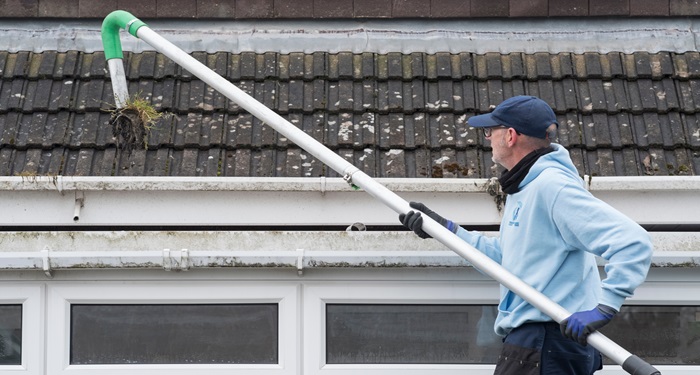
Cast iron guttering costs considerably more. You can pay around £1,500 if your cast iron guttering needs replacing.
Fascia and Soffits
Replacing fascia and soffit boards isn’t cheap, so it’s worth it to do so while you’ve got your scaffolding in place. The cost of replacing fascia and soffit boards is around £140 per linear metre.
If you replacing 25 metres of either fascia or soffit board, which is a typical terraced house, then you’ll need to add around £3,500.
Wooden facias and soffits can be covered with uPVC to help them last longer. It costs a lot less. You can expect to pay around £6 to £12 per linear metre, which means covering 25 linear metres will cost between £150 and £300. In addition, you’ll need to add labour costs.
The job will take between half a day and two days, depending on the size of the property. A roofer will charge, on average, between £76.00 and £128.00 for half a day’s work. One day will cost between £152 and £256. If the job takes two days, then you’ll be paying between £304 and £512 in labour costs.
Painting
Painters generally charge between £16 and £40 per hour. But they might prefer to charge on a per-project basis if they are painting your home’s exterior. The average cost of painting a terraced house is between £550 and £750, with the work taking between 3 and 5 days.
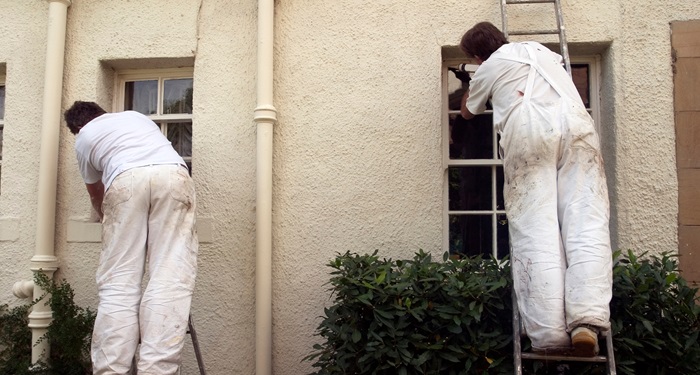
A semi or detached house will cost between £700 and £1,500 to paint and take between 4 and 5 days.
The type of paint you choose will also influence the cost. Masonry paint costs between £2 and £8 per litre. If you also want to paint your front door, then a gloss or semi-gloss paint will cost between £10 and £26.00.
Tradesperson Costs for Installing a Solar Water Heating System
The installation of solar panels is normally included in the price a company will give you to supply and fit the solar panels. If you do use an electrician who is qualified to install solar panels, then you expect to pay between £600 and £1,200.
If you see an installer who is MCS-accredited, it means they are certified installers of renewable energy products and adhere to the regulations and standards of the MCS.
If you also have solar PV panels to generate electricity and you want to sell your electricity back to the grid, then you will need an MCS certificate to do so.
If you don’t intend to sell electricity back to the grid, then you could buy your own solar panels and have them installed by a qualified electrician who has solar panel installation experience. You will normally need to get a quote for installation because costs can differ depending on the number of panels, the size of your roof, and the ease of access.
Prices are most likely to be higher in London and the South East of England, where the cost of services is higher than in other parts of the UK.
An electrician can also install your heat pump and water cylinder. Costs for this service are, on average, between £2,200 and £6,500 for a heat pump installation and between £320 and £460 for a water cylinder installation.
How Long Does It Take to Install a Solar Water Heating System?
A small installation can take between 1 and 2 days. A larger installation can take between 3 and 4 days with two installers. The duration of the installation depends on the number of roof panels and the complexity of installing a hot water cylinder.
The time it takes between your initial consultation with a company and the actual installation can take between 5 and 14 weeks. Steps include initial consultation, site assessments, design, documentation, installation, and inspection.
Types of Solar Water Heating Systems
There are two types of solar thermal panels. Another alternative energy source for hot water is the use of thermodynamic panels or a heat pump with an evaporator panel.
Flat Plate
If your solar panels look like the type of panels you’re used to seeing, then these will be flat plate panels. The heat collection components are located inside the panel and then covered with a transparent cover.
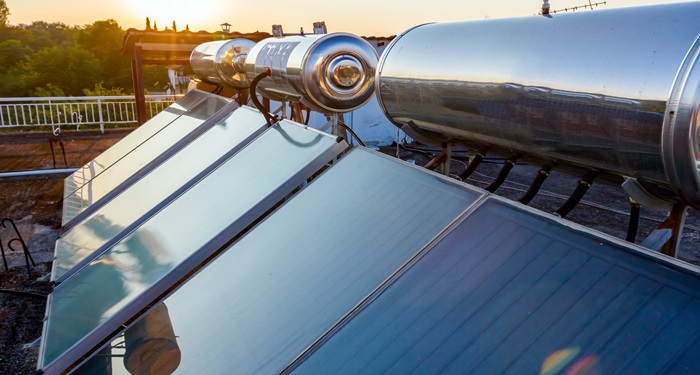
Flat plate systems either fit onto your roof or can be integrated into it so they are flat against the roof. Another advantage is that you don’t need to have roof tiles.
Evacuated Tube
Evacuated Tubes look like a panel made up of a number of long glass tubes. They are normally installed in locations with colder temperatures because there’s no heat loss from the tubes, so they use all the warmth from the sun. The panels are usually quite small, too, which means you don’t need as much space on your roof.
Thermodynamic Panels
Thermodynamic panels are usually situated on the side wall of a property. Rather than absorb energy from light as in standard solar panels, thermodynamic panels absorb heat energy. The panel and a compressor can be connected to your existing hot water tank.
The heat from the air passes through the panel and is helped by a special liquid. The compressor then heats up the water in your tank. The panel, its components, and the installation will, on average, cost between £5,000 and £6,000.
Heat Pump
A solar-assisted heat pump not only uses sunlight to absorb heat but also takes heat from the air. The pump uses electricity, which means that it works without direct sunlight, so it is also efficient during the winter.
The average cost of a heat pump is between £5,000 and £7,000 with a grant from the Boiler Upgrade Scheme. Without the grant, you can expect to pay between £10,000 and £15,000 or more.
Pros and Cons of Solar Water Heating
Pros
- Solar heating still works in the winter. You can still expect around 25% of your hot water in the winter and around 90% during the summer months
- Your carbon footprint will decrease
- Solar heating is a low-maintenance option
- You will save money on your fuel bills
Cons
- You may need a new boiler that’s compatible with a solar heating system
- More expensive to install than other heating systems
- You will need another method of producing hot water during the winter months
How Much Does it Cost to Maintain a Solar Water Heating System
A solar water heating system is low maintenance. You can look after your panels by having them cleaned to remove dirt and debris. There are companies that specialise in cleaning solar panels. The cost for service is on average between £50 and £150.
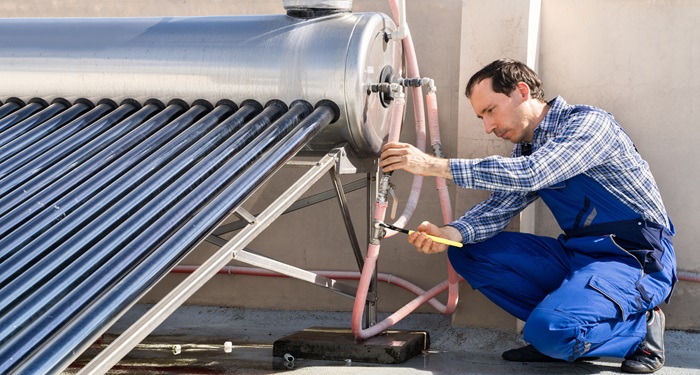
You can clean your solar panels yourself if you can do it without having to climb up to the roof. If you are able to clean them from the ground, then you can use a hose to get rid of residual dirt but to give them a good clean, you’ll need to use warm water, a sponge and a wiper, which means you might be better off leaving the job to a professional who works at height.
If you don’t clean your solar panels regularly, the build-up of dust, dirt, and debris can limit the light getting through the panel, which means it isn’t functioning as well as it should.
Other things to check are the levels of anti-freeze. If you need the liquid replaced, you expect to pay around £100. After around 10 years, you should check your pump. They typically last 10 years and cost between £85 and £100 to replace.
FAQs
Q: How much can I save on energy bills with a solar water heating system?
A: A solar heating system will enable you to save between £105 and £200 a year. For example, if you replace your gas system with a solar system, you will save around £105 a year. If you are replacing solar with electricity, then the savings will be around £200 a year.
Q: How long do water heating systems last?
A: Solar heating systems can last for more than 20 years. When you have a system installed, you will normally get a 5 or 10-year warranty. Some companies will also offer a guarantee that includes a yearly visit for the duration of the guarantee to check and clean the panels.
Q: Do I need planning permission for a solar heating system?
A: A standard installation on a UK property doesn’t need planning permission as long as you adhere to the height regulations. However, if you live in a conservation area or your home is a listed building, then you will need permission from your local council planning department.
You or your installer will have to comply with building regulations. This means either you or the installer must submit the plans for the installation to your local department and pay the relevant fee.
When the work is complete, a building regs inspector will visit your property to make sure the installation has been carried out to the building's regulations and then issue the certificate for the installation.
If you don’t want to do this, then use an installer who is part of the Competent Persons Scheme for Microgeneration Technology. For example, someone who is a member of NAPIT. These installers can submit the building regulations application for you and present you with the certificate of installation when the work is complete without the need for a building inspector to visit.
Q: Can a solar water heating system work in winter?
A: Yes. A solar heating system will work during the winter, but it won’t be as effective, and you will need either an immersion heater or a boiler for hot water. If you have a heat pump, though, you won’t need a backup because heat pumps work well in lower temperatures.
Q: What is the best type of solar water heating system for my home?
A: The most cost-effective type of solar heating is to have solar thermal panels on the roof and a cylinder to store your hot water with a boiler or immersion heater for the winter months. You will save money with a solar water heating system (between £105 and £200 a year) and reduce your carbon footprint.

